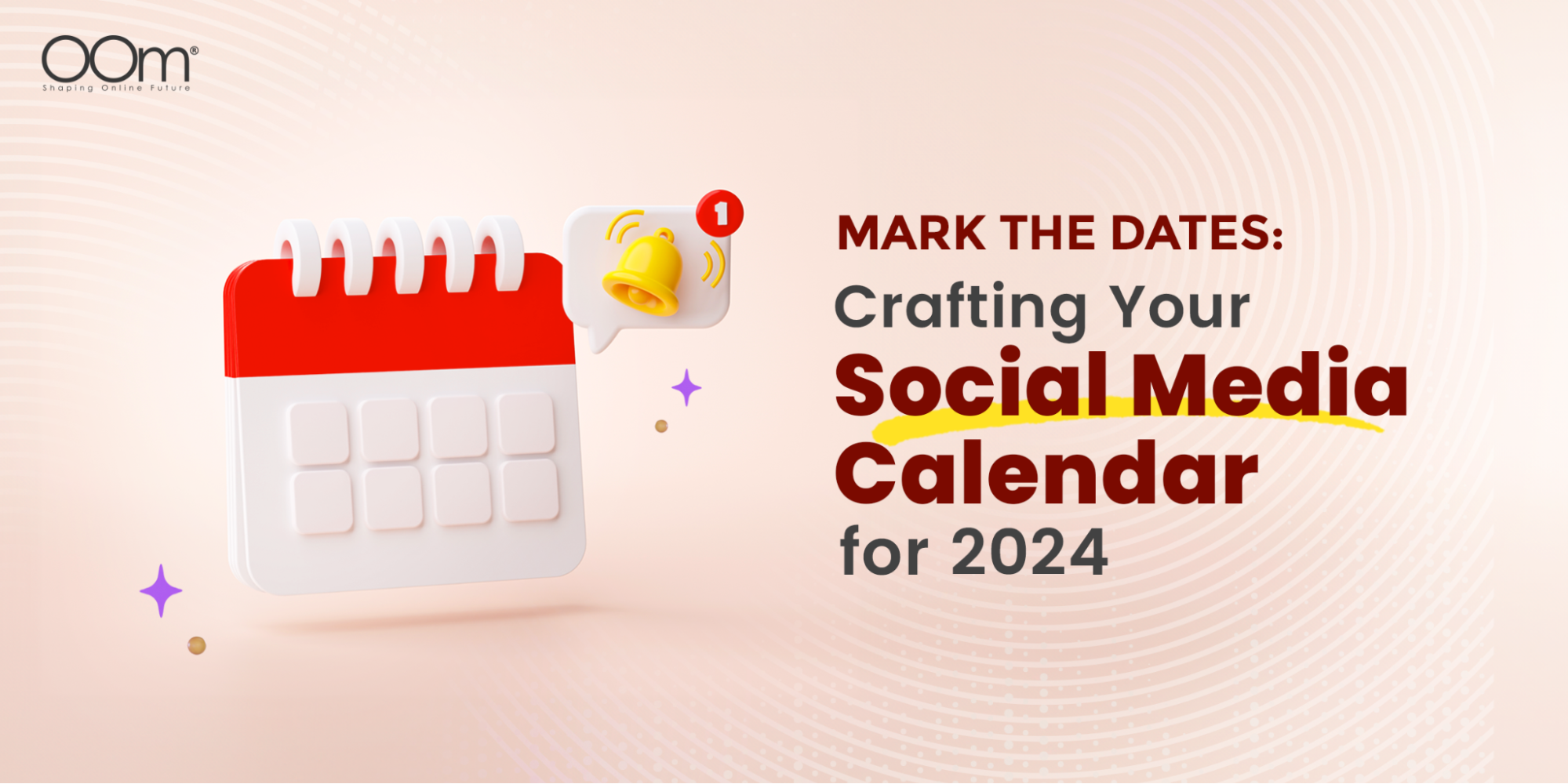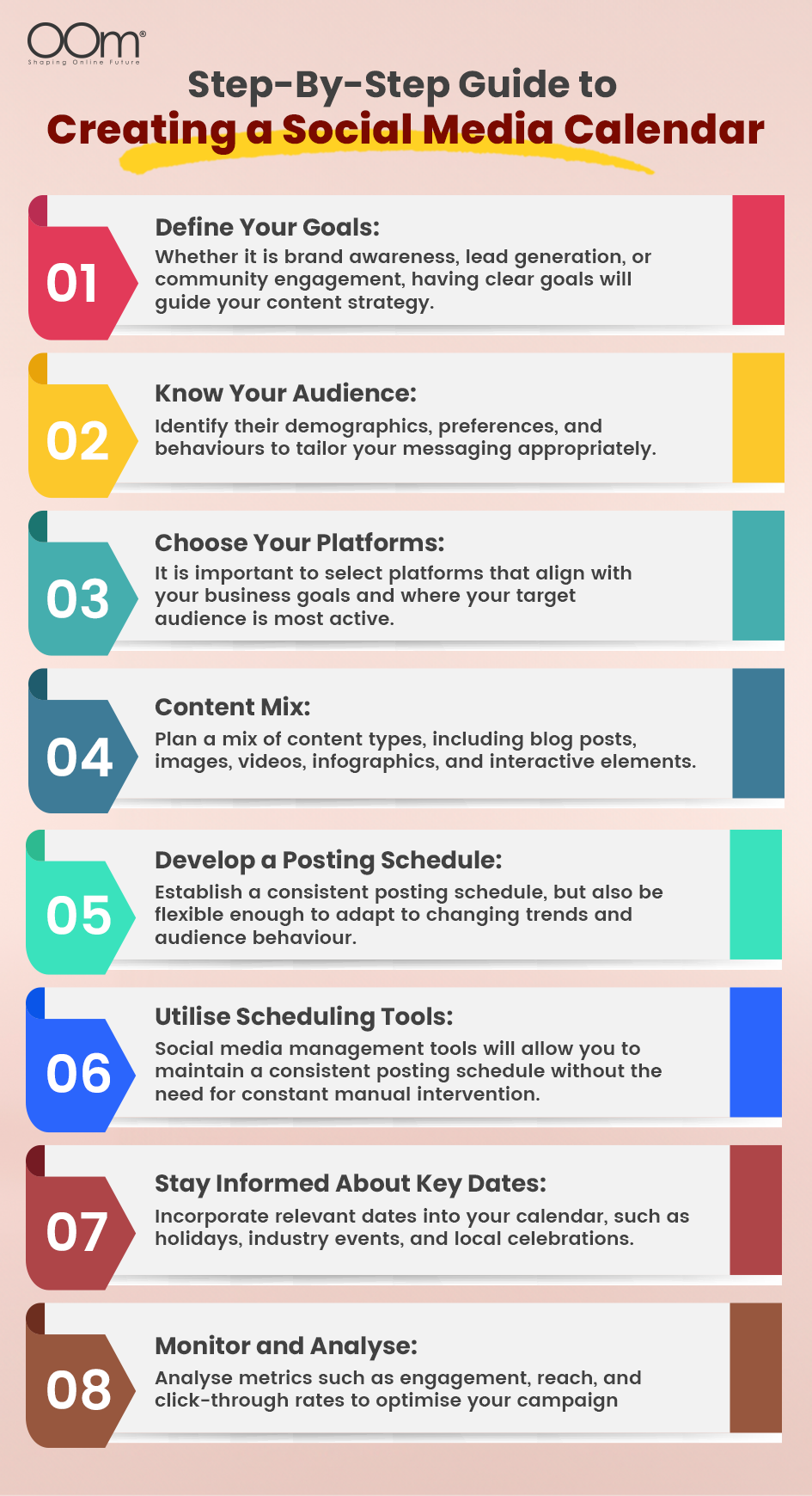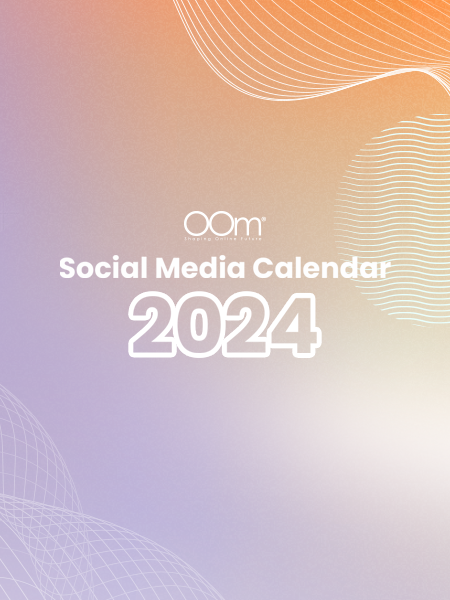
Social media is more than just a virtual space for sharing updates or scrolling through timelines; it is a dynamic force that has reshaped the way we communicate, consume information, and conduct business.
As we gear up for a new year, it is time to delve into the realm of social media planning. In this article, we will guide you through the ins and outs of creating a Social Media Calendar for 2024 to kickstart the beginning of your brand’s digital triumph in the coming year.
Keep reading to find out more.
What Is a Social Media Calendar?
A social media calendar is a meticulously planned roadmap that charts the course of your digital messaging across various social media platforms. This strategic tool is not just a mundane schedule of when to post. Instead, it is a comprehensive plan that synchronises your digital messaging with the rhythm of local and international events, ensuring your brand remains in tune with the pulse of your audience.
It is a forward-thinking approach to content planning, allowing businesses to stay ahead of the curve in their social media campaigns. By planning engaging social media postings well in advance, you will get to capture the attention of your audience amidst the bustling atmosphere of celebrations and avoid being overshadowed by subsequent events.
Why Is a Social Media Calendar Important?
1. Structure and Consistency
By planning and scheduling posts in advance, businesses can ensure a steady flow of content that resonates with their audience. Consistency is key to building brand recognition and trust, and a well-organised social media calendar acts as a guide to achieving this.
2. Alignment With Business Goals
A social media content calendar also serves as a tool to translate business objectives into actionable strategies. Whether the aim is to increase brand awareness, drive website traffic, or boost engagement, the calendar guarantees that each post contributes meaningfully to these objectives.
3. Time Efficiency
With a predetermined schedule, social media teams can streamline their workflow, allocate resources effectively, and focus on creating high-quality content rather than scrambling to meet posting deadlines.
4. Proactive Planning
Businesses can anticipate upcoming events, holidays, and industry trends well in advance. This foresight allows for the creation of timely and relevant content, ensuring that the brand remains not just reactive but actively engaged with its audience.
5. Audience Engagement
Social media is inherently about engagement, and a thoughtfully planned calendar enhances the likelihood of meaningful interactions. By understanding peak times for audience activity and tailoring content accordingly, businesses can optimise their posts for maximum reach and engagement.
How to Create a Social Media Calendar

Creating a useful social media calendar is a strategic process that involves careful planning and foresight. Here is a step-by-step guide to follow:
1. Define Your Goals
Begin by outlining your overarching business and marketing goals. What do you aim to achieve through your social media efforts? Whether it is brand awareness, lead generation, or community engagement, having clear goals will guide your content strategy.
2. Know Your Audience
Understanding your target audience is crucial for social media content creation that resonates. Identify their demographics, preferences, and behaviours to tailor your messaging appropriately. This knowledge will determine the type of content you create and the platforms you prioritise.
3. Choose Your Platforms
Not all social media platforms are created equal. That is why it is important to select platforms that align with your business goals and where your target audience is most active. Each platform may require a unique content approach, so factor this into your planning.
4. Content Mix
Diversify your content to keep your audience engaged by planning a mix of content types, including blog posts, images, videos, infographics, and interactive elements. This variety helps keep your social media feed interesting and dynamic.
5. Develop a Posting Schedule
Consider the optimal times for posting on each platform by using analytics tools to identify when your audience is most active. Establish a consistent posting schedule, but also be flexible enough to adapt to changing trends and audience behaviour.
6. Utilise Scheduling Tools
Take advantage of social media management tools that will allow you to maintain a consistent posting schedule without the need for constant manual intervention.
7. Stay Informed About Key Dates
Incorporate relevant dates into your calendar, such as holidays, industry events, and local celebrations so that your content remains timely and resonates with your audience. Be aware of key dates specific to your target audience and industry.
8. Monitor and Analyse
Regularly monitor the performance of your social media postings. Analyse metrics such as engagement, reach, and click-through rates and use these insights to refine your strategy over time, optimising your content for maximum impact.
Key Dates to Take Note of for Your Social Media Calendar 2024
January 2024
| Date | Event | Relevant Hashtags |
|---|---|---|
| 1 Jan 2024 | New Year’s Day |
#NewYearsDay #HappyNewYear |
| 4 Jan 2024 | National Trivia Day | #NationalTriviaDay |
| 18 Jan 2024 | Get to Know Your Customers Day |
#GetToKnowYourCustomersDay #CustomerAppreciation #WeLoveOurCustomers |
| 24 Jan 2024 | National Compliment Day | #NationalComplimentDay |
| 28 Jan 2024 | Data Privacy Day |
#DataPrivacyDay #PrivacyAware |
February 2024
| Date | Event | Relevant Hashtags |
|---|---|---|
| 4 Feb 2024 | World Cancer Day |
#WorldCancerDay #CancerAwareness |
| 6 Feb 2024 | Safer Internet Day |
#SaferInternetDay #SID2024 |
| 10 to 12 Feb 2024 | Lunar New Year |
#LunarNewYear #LunarNewYear2024 #HappyChineseNewYear2024 #ChineseNewYear #CNY |
| 13 Feb 2024 | Galentine’s Day |
#GalentinesDay #Galentines |
| 14 Feb 2024 | Valentine’s Day |
#ValentinesDay #Valentines #HappyValentinesDay |
| 15 Feb 2024 | Total Defence Day |
#TotalDefenceDay #WeAreTotalDefence |
| 17 Feb 2024 | Random Acts of Kindness Day | #RandomActsOfKindnessDay |
March 2024
| Date | Event | Relevant Hashtags |
|---|---|---|
| 1 Mar 2024 | National Employee Appreciation Day | #EmployeeAppreciationDay |
| 3 Mar 2024 | World Wildlife Day | #WorldWildlifeDay |
| 8 Mar 2024 | International Women’s Day |
#InternationalWomensDay #IWD #InspireInclusion |
| 15 Mar 2024 | World Consumer Rights Day | #WorldConsumerRightsDay |
| 20 Mar 2024 | International Day of Happiness |
#InternationalDayofHappiness #DayofHappiness |
| 23 Mar 2024 | Earth Hour |
#EarthHour #BiggestHourForEarth |
| 29 Mar 2024 | Good Friday | #GoodFriday |
April 2024
| Date | Event | Relevant Hashtags |
|---|---|---|
| 1 Apr 2024 | April Fool’s Day |
#AprilFool #AprilFoolsDay #AprilFools |
| 7 Apr 2024 | World Health Day |
#WorldHealthDay #HealthDay |
| 10 Apr 2024 | Hari Raya Puasa |
#HariRayaPuasa #HariRaya |
| 18 Apr 2024 | Get to Know Your Customers Day |
#GetToKnowYourCustomersDay #CustomerAppreciation #WeLoveOurCustomers |
| 22 Apr 2024 | Earth Day | #EarthDay |
May 2024
| Date | Event | Relevant Hashtags |
|---|---|---|
| 1 May 2024 | Labour Day |
#LabourDay #WorkersDay |
| 12 May 2024 | Mother’s Day |
#MothersDay #Motherhood #HappyMothersDay |
| 15 May 2024 | International Day of Families | #FamilyDay |
| 22 May 2024 | Vesak Day | #VesakDay |
June 2024
| Date | Event | Relevant Hashtags |
|---|---|---|
| 5 Jun 2024 | World Environment Day |
#WorldEnvironmentDay #ClimateChangeIsReal |
| 16 Jun 2024 | Father’s Day |
#FathersDay #HappyFathersDay |
| 17 Jun 2024 | Hari Raya Haji |
#HariRayaHaji #HariRaya |
| 30 Jun 2024 | Social Media Day |
#SocialMediaDay #SocialMedia |
July 2024
| Date | Event | Relevant Hashtags |
|---|---|---|
| 18 Jul 2024 | Get to Know Your Customers Day |
#GetToKnowYourCustomersDay #CustomerAppreciation #WeLoveOurCustomers |
| 21 Jul 2024 | Racial Harmony Day | #RacialHarmonyDay |
| 30 Jul 2024 | International Friendship Day |
#InternationalFriendshipDay #FriendsForever |
August 2024
| Date | Event | Relevant Hashtags |
|---|---|---|
| 9 Aug 2024 | National Day |
#NationalDay #NDP2024 #HappyBirthdaySingapore |
| 12 Aug 2024 | International Youth Day | #YouthDay |
September 2024
| Date | Event | Relevant Hashtags |
|---|---|---|
| 6 Sep 2024 | Teacher’s Day |
#TeachersDay #HappyTeachersDay #ThankYouTeacher |
| 10 Sep 2024 | World Suicide Prevention Day | #WorldSuicidePreventionDay |
| 17 Sep 2024 | Mid-Autumn Festival | #MidAutumnFestival |
October 2024
| Date | Event | Relevant Hashtags |
|---|---|---|
| 4 Oct 2024 | Children’s Day |
#ChildrensDay #HappyChildrensDay |
| 10 Oct 2024 | World Mental Health Day | #WorldMentalHeathDay |
| 31 Oct 2024 | Deepavali |
#Deepavali #Diwali #FestivalOfLights |
| 31 Oct 2024 | Halloween |
#Halloween #SpookySeason |
November 2024
| Date | Event | Relevant Hashtags |
|---|---|---|
| 13 Nov 2024 | World Kindness Day |
#WorldKindnessDay #BeKind #KindnessMatters |
| 11 Nov 2024 | 11.11 | #1111Sale |
| 19 Nov 2024 | International Men’s Day |
#InternationalMensDay #MensDay |
| 29 Nov 2024 | Black Friday |
#BlackFriday #BlackFridaySale |
December 2024
| Date | Event | Relevant Hashtags |
|---|---|---|
| 2 Dec 2024 | Cyber Monday |
#CyberMonday #CyberMondayDeals |
| 10 Dec 2024 | International Human Rights Day | #HumanRightsDay |
| 22 Dec 2024 | Winter Solstice Festival | #WinterSolstice |
| 24 Dec 2024 | Christmas Eve |
#ChristmasEve #ChristmasIsComing |
| 25 Dec 2024 | Christmas Day |
#Christmas2024 #MerryChristmas |
| 31 Dec 2024 | New Year’s Eve |
#NewYearsEve #NYE2024 #NYE |
Examples of Holiday-themed Social Media Posts
The holiday season is the perfect time for businesses to infuse warmth and festivity into their social media presence. That is why having a social media calendar and crafting engaging and creative holiday-themed posts can captivate your audience, spread joy, and enhance brand connection. Let us explore some examples of holiday-themed social media posts that you can take inspiration from.
1. Coca-Cola – The Year of the Rabbit
Crafted by Ogilvy Shanghai, this regional campaign unveiled a captivating short animated film that spanned across eight markets in Asia. Launched on various social media platforms, including YouTube, the campaign is fortified by an innovative AI-powered mobile activation. To add an extra layer of enchantment, limited edition packaging with interactive augmented reality (AR) elements were also introduced. At the core of the film lies the essence of how traditions, while shaping our families, find their magical unity in evolution.
2. Heinz – Tomato Blood Ketchup

Heinz launched an exclusive batch of “Tomato Blood” ketchup bottles, available in limited numbers and fans were invited to showcase their Halloween spirit by crafting a special transformation video on TikTok featuring the iconic Heinz ketchup bottle. Participants were encouraged to elevate their creativity by using the hashtags #HeinzHalloween and #Sweepstakes in their captions and secure a chance to win their very own limited-edition ketchup bottle.
3. Hotels.com – Anti-Valentine’s Day

Hotels.com took a unique approach during Valentine’s Day by steering clear of traditional romantic gestures. Instead, the travel booking platform introduced a distinctive campaign, inviting users to explore their “V-Day Dumpster Stay” webpage. Here, participants were encouraged to share compelling reasons why their ex-partner deserves a vacation in a dumpster. Each entry was a ticket for a chance to win a $300 gift card for Hotels.com.
Plotting Success, Post by Post
By aligning your goals, understanding your audience, and staying attuned to trends, your social media calendar for 2024 becomes the guiding force, ensuring each post is a deliberate step toward success.
Need help with your social media campaigns? Our team at OOm provides a range of social media management solutions to meet your business needs.
Get in touch with us to find out more.

